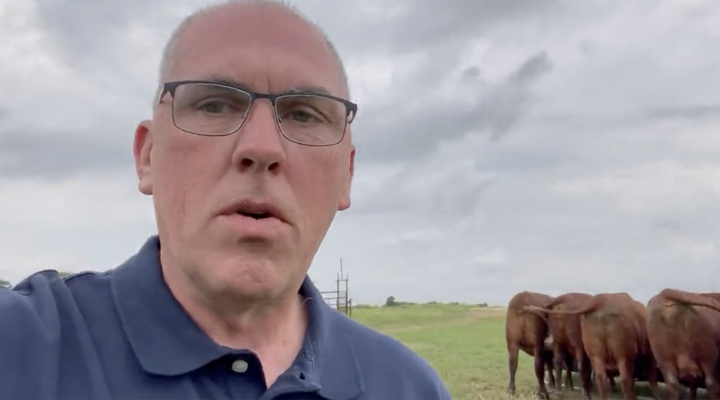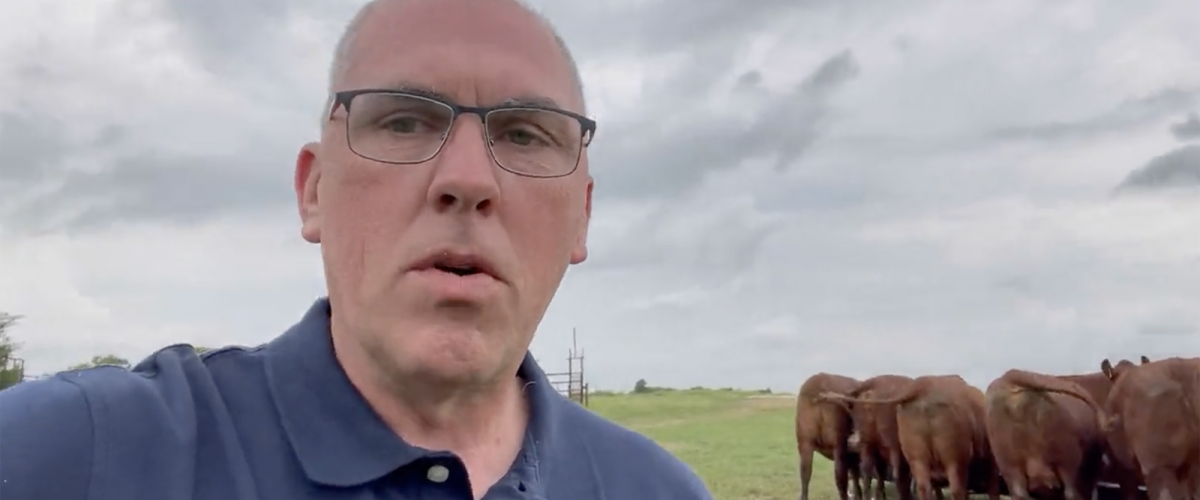Bart Barber is a unicorn among recent Southern Baptist Convention presidents. And now he’s a lame duck, too.
To participate in our interview by Zoom, Barber had to travel away from his North Texas farm. This is unlike any of the modern SBC presidents before him, who all came from the comforts of large churches in big cities.
Barber’s church in Farmersville, Texas, is located in a place that’s just like its name implies: a village for farmers. Suburban Dallas is heading that way but has been impeded by Lake Lavon and a two-lane state highway.
Statistically, Barber and his church are more like the majority of churches in the SBC, which are small and often rural. Although his church is unlike the ones a majority of Southern Baptist churchgoers attend, which are large and urban. That’s the paradox of church life in America today.
All the pastors who have preceded him as SBC president came from churches larger — usually much larger — than First Baptist Farmersville. That makes him a unicorn.
Now, his second term as SBC president is coming to an end. “I’m considered a lame duck president” he quipped with a chuckle.
“I enjoy Robert’s Rules of Order and parliamentary procedure. And I believe in our process.”
“I’m going to miss being president of the SBC,” he confessed. “I enjoy Robert’s Rules of Order and parliamentary procedure. And I believe in our process. God makes a few really weird people like me who like Robert’s Rules of Order, so even when I’m not president, I just enjoy the meeting. I enjoy having thousands of people there who can all go to a microphone. I enjoy spending time with my family and friends and seeing all of them.”
An unfinished agenda
He regrets he hasn’t finished everything he had hoped to do in two years. Currently, the denomination is embroiled in controversy on many fronts, from sexual abuse scandals to the lawsuits and theological controversies — such as the attempt to amend the SBC Constitution to ensure women are not allowed to be pastors.
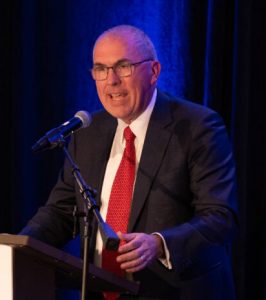
Bart Barber
“I haven’t accomplished everything that I wanted to accomplish as president of the SBC,” Barber said. “It’s also true for 25 years as pastor of First Baptist Church of Farmersville, Texas. It’s good for us to have ambitions that are bigger than what we can accomplish. It keeps us motivated and working. The church is a work in progress. I wouldn’t say I’ve accomplished everything I wanted to accomplish, but I think that with the help of a lot of people, we’ve been able to make things a little better.”
But Barber also has a bit of realism in his understanding.
“It’s increasingly difficult for something like the Southern Baptist Convention to exist,” he explained. “I believe in the work of the Holy Spirit, so I’m optimistic about our ability to do that.”
For example, he said, “we’re still in the adolescence of the internet. What I mean is not so much that we’re in the adolescence of the internet as we’re in the adolescence of our figuring out what to do with the internet. It’s ironic that this greatest mass communication device or system ever created is isolating us. But it is, and the signs of it are all around.
“It’s ironic that this greatest mass communication device or system ever created is isolating us.”
“The more that people who are a part of our churches move away from being in a system that starts in our local churches and our local associations toward being in a system that starts in our keyboards or our phones or our screens, the more difficult it becomes to have something like the Southern Baptist Convention. I believe local associations are helpful with having face-to-face discussions and why we need them.”
He draws strength and hope the dialogue and interaction that take place at the SBC annual meeting each summer. What looks like chaos to outsiders looks like congregational governance to him.
“The annual meeting proves to be the opposite of that year after year. People think that it’s going to be terrible every year. Instead, people are more reasonable and more unified. I think it’s just because Jesus is present when we’re in the company of one another. I wish we would focus again on local associations and state convention meetings, that those places would become our person-to-person, face-to-face training grounds for interacting with one another, with the fruit of the Spirit guiding the way we behave.”
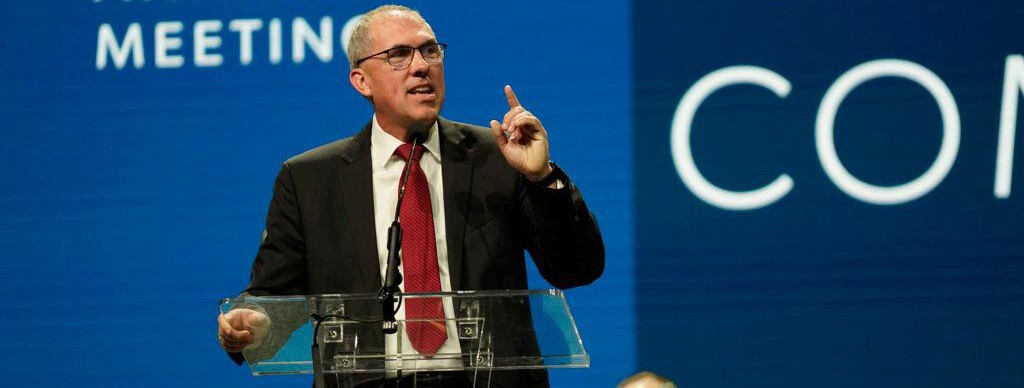
Bart Barber
Sexual abuse
Looking back on his two years as president, Barber realizes two big issues linger in the public eye.
One of those is sexual abuse cases.
“I’ve made mistakes and we’ve had some achievements,” Barber said. “I think we’re going to have a more lasting effect of the achievements than we are the mistakes. Tom Ascol hosted a forum for presidential candidates a couple of days ago. I tried to listen to it, but I’ve been busy, and I’ve really only listened to the first little bit of it. But one of the early questions was, is my church responsible for what somebody else’s church does?”
“Those are interesting questions, but in the end, do you have to conclude that the Southern Baptist Convention or that churches that haven’t had sexual abuse happen are guilty or responsible for what happened in another church? Do you have to conclude that we’re guilty, to conclude that we can do something to help and ought to? Those are two different questions.
“In spite of the fact that I think we’re not guilty of a lot of the things people have accused the convention of being guilty of, in spite of that fact, I do think there’s room for us to do some tangible things that make a difference and help. I’m trying to offer services to local churches that will help local churches to solve three problems that I think they want to solve.
“Nobody is wanting their church to be a place where somebody winds up being abused.”
“The first one is just to prevent abuse from happening in the first place. I think, except for the abusers themselves, nobody is wanting their church to be a place where somebody winds up being abused.
“We’ve taken great strides toward providing resources that local churches can use to harden themselves, especially when you consider how many of our churches are fewer than a hundred people in attendance. It’s easy for people who’ve had access to larger churches to think, well, everybody does background checks and everybody has the resources to. With the reality of smaller churches and rural churches in some places that don’t have the resources, this feels foreign and strange.”
Funding abuse prevention
“The second problem we’re trying to solve,” he continued, “is if abuse does happen, you have to know how to respond to that. I think progress is being made on that in two ways. One, we’re trying to create a situation where everybody knows who they can call if they discover abuse, to get expert advice that is Christian and compassionate, to help churches to know what to do whenever they discover abuse.
“We want people to know of a phone number or to know somewhere they can reach out to a website or something where they can get good advice about what to do.”
“In the past, probably the pastor didn’t know what to do and called somebody who might not have known any better than he did what to do, and there are cases where people have gotten really bad advice and followed really bad advice and done harmful things in response to abuse. We want people to know of a phone number or to know somewhere they can reach out to a website or something where they can get good advice about what to do.”
However, when it comes to the issue of how to fund this, some denominational agency leaders have had a problem with how to pay for these solutions.

Bart Barber
“It’s important to note that the Executive Committee, the SBC, has spent a ton of money on this question,” Barber said. “And that Send Relief has also provided funding for the work we’ve done. There have been differences of opinion about how to pay for things and what to pay. But it’s important to note that those differences of opinion have come in the context of things we’ve agreed on, where there’s been money provided by all of them. We need to be sure to give credit to Southern Baptist entities that have.
Also, he noted, trustees of the SBC Ethics and Religious Liberty Commission voted March 21 to re-designate $250,000 toward the SBC Abuse Reform Implementation Task Force, which has proposed creating a new independent clearinghouse and training center to prevent and respond to abuse in SBC churches.
“The fact of the matter is, paying for things has always been a challenge,” Barber said. “The Executive Committee has spent a lot of money on sexual abuse with the Guidepost investigation. That’s a massive thing the Executive Committee did that cost a lot of money. And now they’re in bad financial shape. It’s improving, but they’re in difficult financial shape because they did that.”
However, Barber is still optimistic.
“Southern Baptists have plenty of money,” he said. “You could fill a room with churches that currently have a building project going on that costs more than that in one local church.”
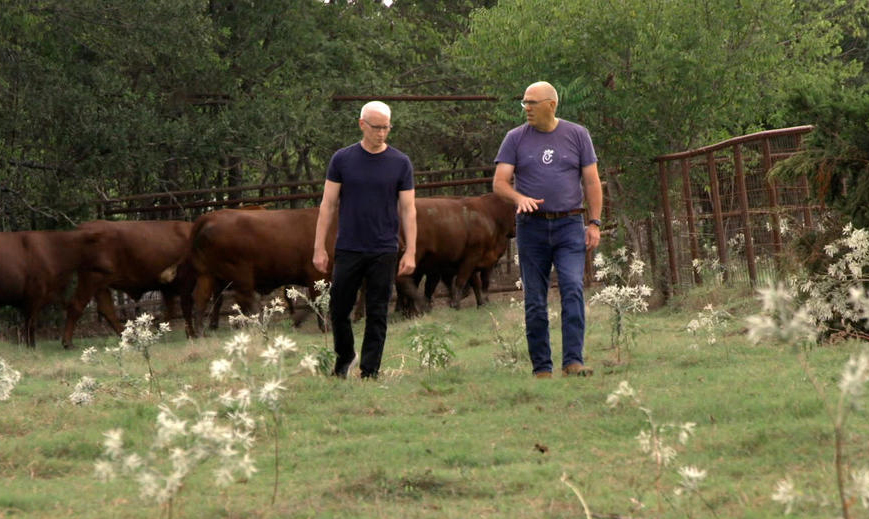
Anderson Cooper and Bart Barber walking on Barber’s Texas property.
Women in ministry
Next to the sexual abuse issues, the denomination also is embroiled in the issue of women in ministry, he acknowledged. Barber’s position on the Law Amendment — to be voted on a second time this summer — has come under attack by some and he is aware of that.
“The fact of the matter is, I have worked to facilitate the messengers having a voice on the Law Amendment.”
“I see people online talking about how I’ve worked against the Law Amendment,” he said. “The fact of the matter is, I have worked to facilitate the messengers having a voice on the Law Amendment. I fought for it to be able to be voted on last year, on the floor of the annual meeting. What happens is what just happened here, people ask me my opinion about it, and I give it. That’s not working against the Law Amendment. It’s being honest when people ask me a question.”
Today’s SBC already is a family of complementarian churches, Barber believes. “We put that to a vote last year on two out of three appeals, that’s a position that wins 90% to 10% in the Southern Baptist Convention. The Baptist General Convention of Texas could not pass a motion that was pro-egalitarian at their annual meeting. And so, the opinion of Southern Baptists on this question is settled. And right now, the process exists for anybody to challenge any church’s friendly cooperation in the SBC based upon whether they have women serving as pastors. And that process is working just fine.
“So, if the Law Amendment fails, nobody should look and say, ‘Hey, we can go have women pastors now, and the SBC won’t care’ because the same mechanism that caused Saddleback not to be in friendly cooperation with the SBC will still be in place even if the Law Amendment fails. And if the Law Amendment passes, that’s not going to mean that suddenly, automatically, every church that has a children’s pastor or a preschool pastor who’s a woman is automatically kicked out of the SBC. Because it’s still the case that somebody has to submit a church like that to the Credentials Committee. And it still has to go through Credentials Committee deliberation, and the Credentials Committee has to form an opinion, and that has to go to the Executive Committee, and the Executive Committee can vote any way they want to.”
While he understands what’s driving the Law Amendment and general concerns about doctrinal purity in the SBC, his view on the way out as president of a denomination he loves is that this cannot become an ever-expanding list.
“I don’t want us to just keep growing a laundry list of things in Article Three of the Baptist Faith and Message, that we’re just adding something every couple of years.”
Related articles:
Barber easily wins re-election as SBC president
On proposed constitutional amendment, SBC president is a ‘yes, and’

